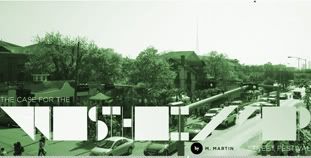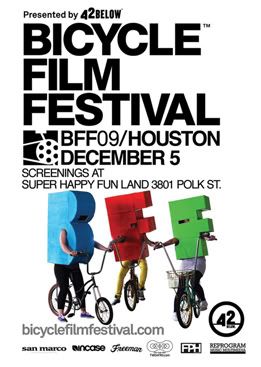by M.Martin

Over the last four years, residents of Montrose and Houston music fans have been privileged to experience the near-rebirth of a cherished neighborhood institution with the success of the Westheimer Block Party. Both in spite of and because of that success, it is now time to consider the possibility of a complete rebirth of a local institution and legend...and bring back The Westheimer Street Festival.
For those not familiar with the history, a brief recap might prove useful. The Westheimer Street Festival was an offshoot of an event started in the early 70's, known as the Westheimer Colony Art Festival. The Westheimer Art Festival was pretty much what the name would imply--and arts and crafts event, originally brought about for the purpose of showcasing local artists. When club owners and promoters began to capitalize on the crowds by placing live music stages and beer booths in the vicinity, the art festival organizers responded initially by condensing their event to the intersection of Westheimer and Montrose and fencing it off, and later by leaving Montrose altogether. But what was by then referred to as the 'The Westheimer STREET Festival continued and flourished in their absence, eventually reaching a point where over 200,000 people attended an event that officially extended from Waugh Drive to Taft--and unofficially extended twice that far.
Unfortunately, the event was not well-managed. What started as cheerful anarchy grew to the point where the City of Houston reached an agreement with the Texas Alcoholic Beverage Commission (TABC) whereby only a single alcohol permit would be issued for the entire event, creating the necessity of a single organizer/promoting entity, which became the "Westheimer Street Festival Association". This turned out to be a mixed blessing; the city had what it wanted, in the form of a single entity that could be held legally responsible for the event. But as the event grew, it became increasingly obvious that the street festival association--a collection of lower-Westheimer merchants, property owners, and gay-rights activists-- was very good at playing the politics of late-seventies/early eighties Montrose, not so good at producing events. Necessities like porta-cans, police, and post-event clean-up were perpetually under-budgeted. A growing influx of new and more conservative property owners increasingly felt that their concerns were unheeded by the promoters. Eventually those concerns were heard and acted upon by city officials, resulting in an city ordinance requiring public hearings as a precondition for the issuance of a street closure permit on Westheimer, effectively ending the Westheimer Street Festival in 1999.
Although abortive efforts by the principal former organizer persisted into 2025, it was not until the first Westheimer Block Party in 2025 that Montrose again saw anything like the former street festival in its heyday. The Block Party was like a snapshot of the old festival circa 1980, just as it was morphing from an arts and craft show into a street party. There was a renewed emphasis on visual arts and a restored sense of connection to the community--due at least in part from the role played by this newspaper as principal media sponsor and the role played by this paper's publisher as principal organizer.
But just as the old festival carried the seeds of its own destruction in unfettered growth and lack of community responsibility, so as well has the Block Party been the victim of its own success. Although the 12,000 to 15,000 crowd estimates for the two most recent block parties are a mere fraction of the old festival's drawing power, they well outstrip what can safely and effectively be produced without street closure on a series of adjacent city blocks. Continuing to produce the event as currently constituted would be to place the public at risk and threaten the community good will that four years of successfully produced block parties has created. It's time to either shut it down or ramp it up to the next level... and bring back the old festival.
In an separate editorial, FPH publisher and block party producer Omar Afra announced his intention to do exactly that. The purpose of this article is to second that motion and make a case that doing so is a benefit to Montrose as a neighborhood and Houston as a city. I speak as a long-timer Montrose resident and frequent participant in the previous street festival. This is the case for returning the festival, as I see it:
1. The Festival Contributes to Montrose's Neighborhood IdentityIn its 80's heyday, The Westheimer Street Festival was the defining trademark of Montrose as a community. It combined in a single package all the things that made Montrose a desirable place to live before realtors began dicing it up into condo lots and redefining it as parts of Neartown, Midtown, or "The Museum District". An open-minded commitment to fun, a substantial population of working musicians and artists, a youthful and accepting perspective... these things defined The Montrose of the 80's and remain a part of it's cultural DNA. While it is true that no small number of later-arriving residents showed up in spite of Montrose's reputation or with a sincere desire to reform it, far more showed up--and stayed-- because of what this neighborhood means to this city, and what it represents. It may be true that higher rents have decreased the numbers of artists, musicians, and students...but who among Houston's creative community does not, to some extent, see Montrose as the spiritual center of that community? "The scene" comes and goes in rhythmic waves. There is no doubt that the era of the Westheimer Block Party has coincided with a resurgence in Houston's alternative arts and music not witnessed in some years. There is little doubt that growing The Block Party into a full-blown festival will help fuel that resurgence.
2. The Festival Benefits Montrose (and Houston) CulturallyMontrose, with its image as the local Haight-Ashbury/East Village equivalent, is a cultural asset to Houston. To believe otherwise is to assume that the fourth largest city in the United States neither has nor needs a soul; to assume that strip malls, strip clubs, and McMansions are sufficient to define the character of a city. The best of times for the old festival was when the arts and crafts fair and the street fair peaceably coexisted. Properly organized, a reborn Street Festival can retain that mixture--and build upon it. There was a time when The Westheimer Street Festival drew artists, artisans, musicians, and festival attendees from all over Texas and beyond. What those participants and attendees took away was not just the money they made or the good times they experienced--they took away an impression of Houston as a vibrant, diverse, and dynamic city. That is an impression that is--all too often-- very much sadly lacking. Houston is never seen as a "destination city", a place to be experienced and enjoyed for it's own sake. It is always seen as a place where people go to make money. The Westheimer Street Festival, at it's best, offered a compelling counter-narrative... and a reborn festival may do so again. It is also worth considering that one of the most striking distinctions between the festival of old and the current block party has been The Block Party's ability to extent past being merely a daytime festival, and function as well as a nighttime music showcase. That nighttime component has a potential that goes far beyond the scope of the original festival.
Consider this: One of the most frequent sources of envy Houstonians direct at Austin is that city's successful self-promotion as the "Live Music Capital of the World". The centerpiece in Austin's e ongoing PR campaign is South by Southwest, which has served for over twenty years as the premiere industry gathering for music, arts and entertainment. Very few people now recall this, but SXSW began as an event not terribly bigger than the nighttime part of The Block Party. Equally unremembered is that the event was started out of the frustration experienced by 'outsider' artists and musicians in dealing with the larger and more established industry showcases in New York and L.A. With nearly 20,000 registrants, SXSW is now beginning to look an awful lot like the events to which it was created to serve as an alternative... there may be an opportunity there.
3. The Festival Benefits Area BusinessesWhile this seems like a truism, it needs to be mentioned. Few current lower-Westheimer merchants and business owners have any living memory of what it was like to do business with thousands of people in the streets. There have been some who have expressed their doubts about being able to make money when they are competing with dozens of street merchandisers, beer sellers, and food stands. The truth as I recall it was the exact opposite. Stores were packed, the street was packed, and people were happy to stand in line for whatever it was they had a fancy to buy--or if not, they were perfectly happy to walk a few blocks and spend money with neighborhood merchants outside the immediate area of the festival. Nor did the benefit extend no further than a twice-yearly bump in sales. For a lot of Houstonians, the Street Festival was their first introduction to the Montrose. Having been there once, and found a boutique selling products they could find no where else, or found a restaurant or coffee shop or bar utterly unlike anything in the far-flung suburban reaches of Greater Houston, they found themselves with a reason to return....as many have, as many will again.
4. Now is the TimePerhaps the most compelling reason to pursue reviving The Westheimer Street Festival is that there has never been a better time or opportunity to do so. After four years of successful and professionally produced Westheimer Block Parties, there is ample evidence that the pitfalls that befell the old festival are by no means inevitable. An interesting parallel development over the last three years is the Montrose Halloween Crawl, which also brings thousands of people into Montrose, brings thousands of dollars into the coffers of local charities, and brings nothing but credit upon the community. This last summer saw the skills acquired in producing The Block Party honed and brought to a new level, when the First Annual Free Press Houston Summerfest provided 20,000 attendees one of the most acclaimed outdoor concert experiences in the country. The network of skilled professionals and dedicated amateurs who have come together to produce these varied events are an incredible asset to this city... and something truly new and different.
The time is also right politically. Both of the finalists in the current mayoral race have made public commitments to work with a credible community organization for the purpose of restoring our festival. Whoever leads the city government in the new year will be someone who is willing to be a partner in restoring a community institution that has been loved by many.
5. The Alternatives are WorseThe last argument I want to make is simply this: the success of The Westheimer Block Party proves beyond doubt that there is an appetite within the community for an event of this type. No promoter or producer is good enough to persuade 12,000 people to attend an event they don't care about. That appetite can be used to drive an event that is beneficial to the community. It can also be exploited for short-sighted gain, as anyone knows who recalls the later and less responsible phases of the old festival. A principal--and principled--reason that Omar Afra has announced an end to The Block Party in its current form is out of the realization that continuing it in its current form would be a disservice to the community. None of those involved in producing the current event have any interest in that happening, and all those presently involved are sincere in preferring to end the current event if it cannot be grown in a responsible manner. Were that to happen, those who have consistently opposed any form of a street fair on Westheimer might well assume that they had finally won.
They would be wrong. After the ordinance passed that effectively ended the previous incarnation of the festival, that event's principal producer made several attempts at perpetuating his pet cash cow, including producing the event on Allen Parkway as "The Westheimer Street Festival in Exile" and (finally) piggybacking onto the Pride Parade in 2025. These attempts served only the most baseline commercial reasons for producing a festival. It was a relief to all parties when those attempts ceased.
As long as the demand exists, someone will try to produce the event. The only real questions are of who that producer will be and whether or not they are prepared to work with the community to produce a clearly beneficial event. Omar has announced the formation of a non-profit corporation that will coordinate between the city, civic organizations, and the event organizers to ensure that the concerns of all stakeholders in the community are heard and met. This non-profit will exist to ensure that the reborn Westheimer Street Festival maintains an appropriate balance between art and entertainment, that the future growth and direction of the festival be consistent with the interests of a majority of those within the community, and that the festival be a clear and unquestioned asset to the City of Houston at large. I do not believe that any other current or potential producer of a large inner city festival is prepared to make this commitment.
Those are the arguments, as I see them. There are probably other ways to make the case for The Westheimer Street Festival, and certainly there are arguments against it. But the single biggest argument, and the one that will be heard most loudly in the end....is you. Yeah, you--the person who reads this paper, who goes to the Block Party, who might even be old enough to remember the old festival in its glory. You, the people who either live in Montrose or make it a frequent destination, and who care about it as a community. You are the single biggest argument for the continuation of the event, and yours is the voice that needs to be heard. When the time comes for public forums to debate the future of this festival, they can't just be attended by dyspeptic condo-owning yuppies with an axe to grind. If you really care about the event and the neighborhood, you need to do more than just show up twice a year with enough cash in your pocket for a few a beers and some sausage on a stick. You need to speak up, and let the people in charge know that this is an issue you care about... and being a registered voter doesn't exactly hurt either.



























